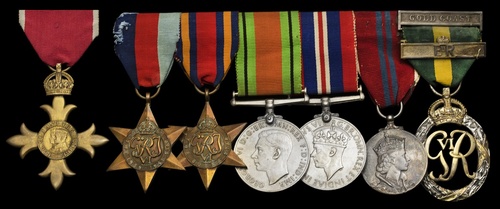
Auction: 24003 - Orders, Decorations and Medals
Lot: 168
(x) A 1949 O.B.E. group of seven awarded to Lieutenant J. Trevelyan, C.B.E., Gold Coast Territorial Force, Secretary of the British Board of Film Censors, where he allegedly became the namesake for Ian Fleming's Bond villain Alec Trevelyan in Golden Eye
The Most Excellent Order of the British Empire (Civil Division), 2nd Type Officer's (O.B.E.) breast Badge, silver-gilt; 1939-1945 Star; Burma Star; Defence Medal; War Medal 1939-45; Coronation 1953; Efficiency Decoration, G.VI.R., Gold Coast, with Second Award Bar, this 'E.II.R.', mounted as worn, very fine (7)
[C.B.E.] London Gazette 12 June 1971.
O.B.E. London Gazette 1 June 1949.
John Trevelyan was born at Beckenham on 11 July 1903, the son of George and Monica Trevelyan. Educated at Lancing College and Trinity College, Cambridge, he graduated to become a teacher serving as a Schoolmaster at Amesbury School, Hindhead, Surrey from September 1925. Joining the Gold Coast Territorial Force as a Lieutenant on 10 April 1928 he additionally became Inspector of Schools within the Education Department of the Gold Coast.
Unfortunately, he became physically unfit for service in the tropics returning home, joining the Kent Education Committee in July 1930. Later he was appointed Assistant Secretary at the West Sussex Education Committee in 1933, advancing to the role of Secretary for Education, East Suffolk in 1936 before and the Westmorland Education Committee, finally becoming Director of Education for Kent.
After the war Trevelyan served in Germany with the Control Commission as Director of the British Families Education Service from July 1946-1949. Having been involved in educational administration, in 1951 he joined the British Board of Film Censors as a part-time examiner, and in 1958 became Secretary following the resignation of John Nicholls.
He brought a more liberal approach to the role of Chief Censor than his predecessors, claiming '...we are paid to have dirty minds'. Under Trevelyan's purview, content including adultery and premarital sex (Room at the Top, 1959), homosexuality (Victim, 1961), and abortion (Alfie, 1966) was allowed on British cinema screens. His Times obituary said that he 'never shrank from using his scissors, especially when it came to protecting the young'.
Trevelyan passed the 1969 Ken Russell film Women in Love (adapted from the D. H. Lawrence novel) with minor cuts, and received a complaint about the nude wrestling scene between the two male stars which claimed that the actors were 'displaying their genitals'. He came to the defence of American artist Andy Warhol and filmmaker Paul Morrissey in 1970 when their film Flesh was seized by police during a showing at the Open Space Theatre at Tottenham Court Road in London.
Retiring from this role in 1971 he shortly afterwards wrote a book on his experiences entitled 'What the Censor Saw', which was published in 1973. He was a critic of the early Bond films when the film GoldenEye was released in 1995, the villain of the film was named Alec Trevelyan, allegedly in reference to him.
During an episode of the British comedy show Monty Python's Flying Circus, an animated sketch shows a hand removing a fig leaf from a representation of Michelangelo's David, only to reveal the cartoon face of Trevelyan, who informs the viewer: 'We're not about to allow this sort of smut to be shown on screen'. Trevelyan died at Croydon on 15 August 1986.
It should be noted that Tamplin's reference volumes on the Roll of the Efficiency Decoration do not record Trevelyan as being awarded the medal nor Bar under the auspices of the Gold Coast; however this may be an example of a type issued in error.
Sold together with the following original archive comprising:
i)
Letter for accompanying Commission from the Adjutant, Accra, dated 29 March 1930 with Commission as Lieutenant, dated 7 February 1930
ii)
Numerous letters of congratulation for the award of his O.B.E.
iii)
Letters of recommendation for his appointment to his various educational appointments
iv)
Menu for a luncheon in his honour, held at the Royal Lancaster Hotel, 15 September 1971.
Subject to 5% tax on Hammer Price in addition to 20% VAT on Buyer’s Premium.
Sold for
£550
Starting price
£240




